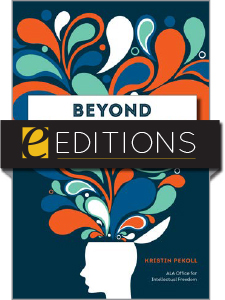
Beyond Banned Books: Defending Intellectual Freedom throughout Your Library—eEditions e-book
The download link for this product can be found on the final confirmation screen after you complete your purchase, and may also be accessed from your Account Profile. For more information about ALA eEditions file types and how to view them on eReaders, desktop computers, and other devices, see this page.
Primary tabs
You don't need to be an ALA Member to purchase from the ALA Store, but you'll be asked to create an online account/profile during checkout to proceed. This Web Account is for both Members and non-Members. Note that your ALA Member discount will be applied at the final step of the checkout process.
If you are Tax-Exempt, please verify that your account is currently set up as exempt before placing your order, as our new fulfillment center will need current documentation. Learn how to verify here.
- Description
- Table of Contents
- About the authors
- Reviews
Equitable access to information for all, including underserved populations, is a core value of librarianship. The growing awareness of where this inequality persists has led many professionals to take steps to advance social justice within their institutions, from creating book displays about the Black Lives Matter movement or LGBT History Month to hosting programs by potentially controversial speakers. But while libraries are often well-versed in protecting the right to read books, many lack policies and experience in addressing censorship of resources and services. This resource from Pekoll, Assistant Director of the American Library Association’s Office for Intellectual Freedom (OIF), uses specific case studies to offer practical guidance on safeguarding intellectual freedom related to library displays, programming, and other librarian-created content. Essential for library directors, administrators, marketers, and programming staff, Beyond Banned Books
- spotlights case studies drawn from public libraries, schools, universities, and government agencies dealing with library displays, artwork, programs, bookmarks and reading lists, social media, and databases;
- summarizes possible complaints and controversies related to each area;
- draws connections between the intellectual freedom principles involved and associated legal issues, with relevant court opinions when possible;
- shares questions to consider when strengthening a library’s defenses against censorship;
- discusses the importance of reporting challenges to OIF, and the professional and institutional support that OIF can provide when challenges arise; and
- includes key ALA policies on intellectual freedom as appendices.
This guide will ensure that libraries are prepared to protect diverse voices from censorship while fostering more inclusive institutions that represent and welcome all people and ideas.
Foreword, by Martin Garnar
Preface: “You’re Going to Hell”
Introduction: Pushing the Needle
Chapter 1 Displays and Exhibits
Chapter 2 Artwork
Chapter 3 Programs and Events
Chapter 4 Bookmarks and Reading Lists
Chapter 5 Social Media
Chapter 6 Databases
Chapter 7 Report and Support
Appendix
- Library Bill of Rights
- Access to Digital Information, Services, and Networks
- Access to Library Resources and Services Regardless of Sex, Gender Identity, Gender Expression, or Sexual Orientation
- Challenged Resources
- Education and Information Literacy
- Equity, Diversity, Inclusion
- Exhibit Spaces and Bulletin Boards
- Library-Initiated Programs as a Resource
- Politics in American Libraries
- The Universal Right to Free Expression
- Visual and Performing Arts in Libraries
- Code of Ethics
Index
Office for Intellectual Freedom (OIF)
ALA's Office for Intellectual Freedom (OIF) is charged with implementing the intellectual freedom policies of the American Library Association through educating librarians and the public about the concept of intellectual freedom as embodied in the Library Bill of Rights, the Association's basic policy on free access to libraries and library materials. In order to meet its educational goals, the Office undertakes information, support, and coordination activities.
Kristin Pekoll
Kristin Pekoll is Assistant Director of the American Library Association’s Office for Intellectual Freedom in Chicago. For twelve years she was the youth librarian at the West Bend Community Memorial Library in Wisconsin. Her primary focus is supporting librarians who are dealing with censorship issues, and she also works to raise awareness of the value of intellectual freedom within the library profession and among the public.
"[Pekoll] has written a very clear, useful, practical, and even a motivational book ... Overall, the book serves as a valuable guide to very complex ideas and keeps the complexity from being overwhelming by offering concrete examples and an easy-to-follow organization. The book can help guide in real life situations and also help guide librarians in crafting well-informed intellectual freedom policies."
— Intellectual Freedom Blog
"Readers will appreciate Pekoll's authoritative, clear discussion. Invaluable to anyone interested in censorship attempts on all varieties of resources."
— Library Journal
"Pekoll's book will be an effective resource for professionals combating censorship challenges outside of traditional print formats, and the case studies make for concrete examples of such challenges. A useful book for any library."
— CHOICE
"In this excellent overview of intellectual freedom in libraries, author Kristin Pekoll makes the case that intellectual freedom is about much more than banned or challenged books ... This well-written and engaging book would be appropriate for professional librarians in school, public, or academic libraries."
— Catholic Library World


